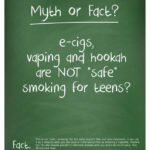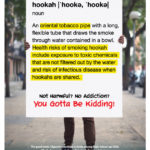Tobacco Prevention in Westchester
Even though the number of younger Americans who smoke cigarettes has been going down since the late 1990s, tobacco use continues to be an issue.
According to the 2012 Surgeon General’s Report, very few people start smoking after age 25; in fact, nearly 9 out of 10 adult smokers had their first smoke by the age of 18. The younger a person is when they start using tobacco, the more likely they are to use it as an adult. People who start regularly using tobacco when they are younger are more likely to have trouble quitting than people who start later in life.
If we can keep kids tobacco free until age 18, most will never start using it!
Parents, help your child stay tobacco free.
Your attitudes and values influence those of your children, including their opinions about t
obacco use and smoking cigarettes. You can take the following actions to help ensure that your children remain or become tobacco-free:
- If you don’t smoke or use any form of tobacco products, don’t start. If you do use tobacco, quit. If you need help to quit and stay quit, call the American Cancer Society at 1-800-227-2345.
- If you are a former smoker, share your experience with your children. Why did you start smoking? How did it make you feel? What made you want to quit? How do you feel after quitting?
- Maintain a smoke-free and tobacco-free home.
- Tell your kids that it is important for them not to smoke or use any form of tobacco. Let your children know that there is no safe way to use tobacco and that smoking leads to illnesses such as respiratory diseases and cancer.
- Emphasize the immediate health effects of smoking like bad breath, yellow teeth, smelly clothes, wrinkled skin, and a greater chance of illness.
- Explain to your children that only 1 out of 5 adults smokes – and nearly half of them wish they could quit.
-
Source: American Cancer Society



